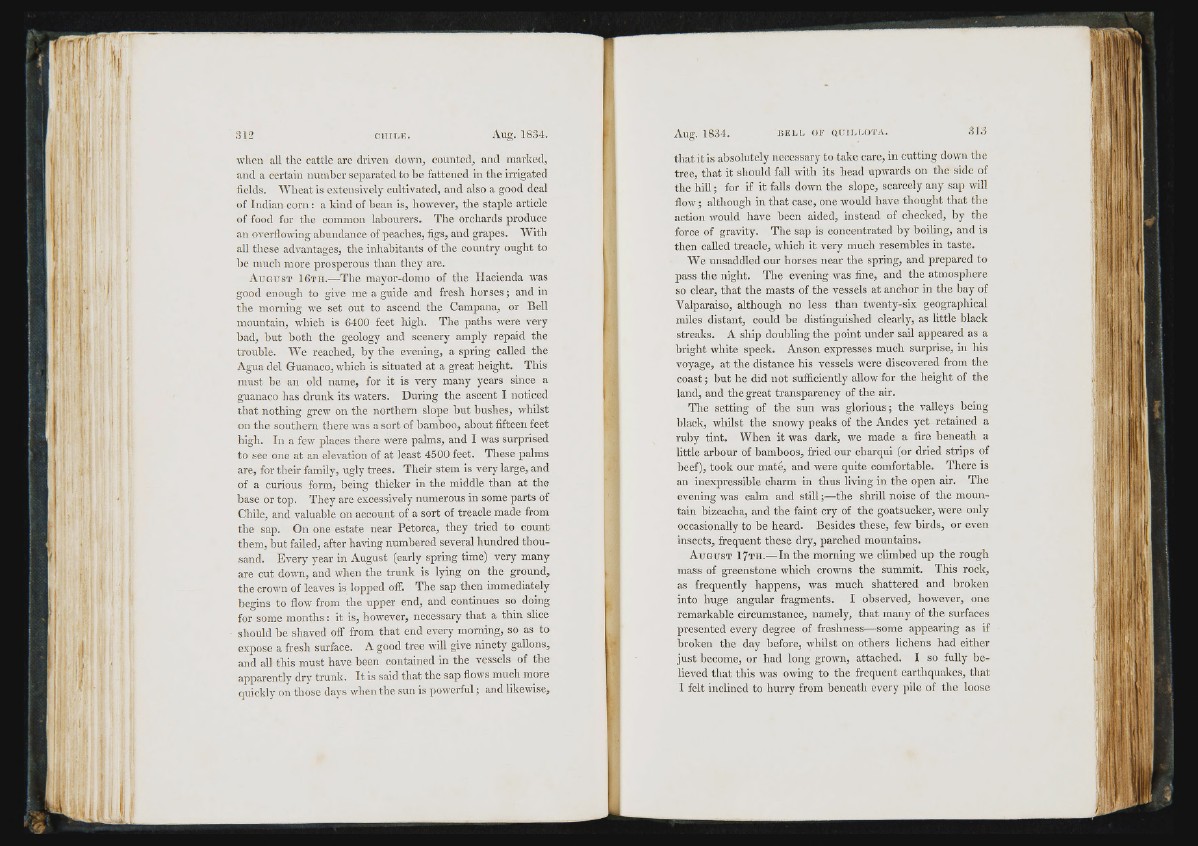
I i
. I i '
!
when all the cattle arc driven down, counted, and marked,
and a certain number separated to he fattened in the irrigated
fields. AA’heat is extensively cultivated, and also a good deal
of Indian com : a kind of bean is, however, the staple article
of food for the common labourers. The orchards produce
an overflowing abundance of peaches, figs, and grapes. AArith
all these advantages, th.e inhabitants of the country ought to
be much more prosperous than they are.
A u g u s t 1 6 t h .—The mayor-domo of the Hacienda was
good enough to give me a guide and fre.sh horses; and in
the morning we set out to ascend the Campana, or Bell
mountain, which is 6400 feet high. The paths were very
bad, but both the geology and scenery amply repaid the
trouble. AA’e reached, by the evening, a spring called the
Agua del Guanaco, which is situated at a great height. This
must he an old name, for it is very many years since a
guanaco has drunk its waters. During the ascent I noticed
that nothing grew on the northern slope but bushes, whilst
on the southern there was a sort of bamboo, about fifteen feet
high. In a few places there were palms, and I was surprised
to see one at an elevation of at least 4500 feet. These palms
are, for their family, ugly trees. Their stem is very large, and
of a curious form, being thicker in the middle than at the
base or top. They are excessively numerous in some parts of
Chile, and valuable on account of a sort of treacle made from
the sap. On one estate near Petorca, they tried to count
them, but failed, after having numbered several hundred thousand.
Every year in August (early spring time) very many
are cut down, and when the trunk is lying on the ground,
the crown of leaves is lopped off. The sap then immediately
begins to flow from the upper end, and continues so doing
for some months: it is, however, necessary that a thin slice
should be shaved off from that end every morning, so as to
expose a fresh surface. A good tree will give ninety gallons,
and all this must have been contained in the vessels of the
apparently dry trunk. It is said that the sap flows much more
quickly on those days when the sun is powerful; and likewise.
tliat it is absolutely necessary to take care, in cutting down the
tree, that it should fall with its head upwards on the side of
the h ill; for if it falls down the slope, scarcely any sap will
flow; although in that case, one would have thought that the
action would have been aided, instead of checked, by the
force of gravity. The sap is concentrated by boiling, and is
then called treacle, which it very much resembles in taste.
AA''e unsaddled our horses near the spring, and prepared to
pass the night. The evening was fine, and the atmosphere
so clear, that the masts of the vessels at anchor in the bay of
Valparaiso, although no less than twenty-six geographical
miles distant, could be distinguished clearly, as little black
streaks. A ship doubling the point under sail appeared as a
bright white speck. Anson expresses much surprise, iu his
voyage, at the distance his vessels were discovered from the
coast; but he did not sufficiently allow for the height of the
land, and the great transparency of the air.
The setting of the sun was glorious; the valleys being
black, whilst the snowy peaks of the Andes yet retained a
ruby tint. AVhen it was dark, we made a fire beneath a
little arbour of bamboos, fried our charqui (or dried strips of
beef), took our maté, and were quite comfortable. There is
an inexpressible charm in thus living in the open air. The
evening was calm and still;—the shrill noise of the mountain
bizcacha, and the faint cry of the goatsucker, were only
occasionally to be heard. Besides these, few birds, or even
insects, frequent these dry, parched mountains.
August 17th.—In the morning we climbed up the rough
mass of greenstone which crowns the summit. This rock,
as frequently happens, was much shattered and broken
into huge angular fragments. I observed, however, one
remarkable circumstance, namely, that many of the surfaces
presented every degree of freshness—some appearing as if
broken the day before, whilst on others lichens had either
just become, or had long grown, attached. I so fully Ije-
lieved that this was owing to the frequent earthquakes, that
I felt inclined to hurry from beneath every pile of the loose